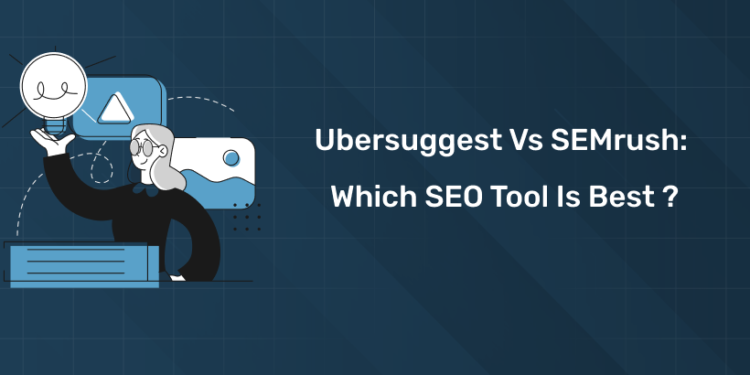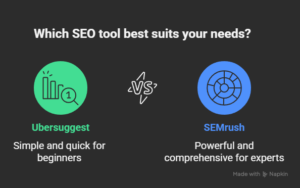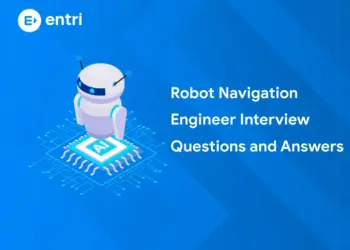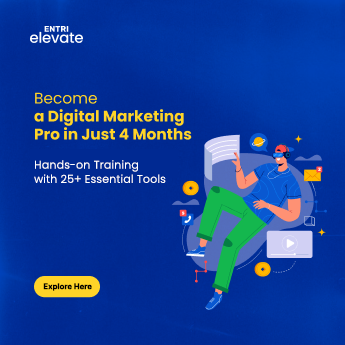Table of Contents
Introduction
Picture this: Your website sits quiet while competitors climb search results. One wrong choice in tools, and months of work vanish. SEO tools fix that. They spot keywords, check rivals, and find site flaws. Pick the right one, and traffic flows in. The wrong pick wastes time and cash.
Enter Ubersuggest and SEMrush. Both promise big wins in search engine optimization. Ubersuggest, from Neil Patel, keeps things simple for quick starts. SEMrush packs power for deep dives. This guide breaks them down side by side. It covers features, costs, strengths, and fits. By the end, you know which SEO tool suits your goals. No fluff. Just facts to boost your site. Ready to find your edge? Let’s dive in.
Join Our Online Digital Marketing Course & Learn the Fundamentals!
Overview of Ubersuggest
1: What is the primary goal of SEO (Search Engine Optimization)?
Ubersuggest started as a free keyword finder. Neil Patel built it in 2017 to share SEO secrets with everyone. Today, it serves over 250,000 users. From solo bloggers to big firms, it helps grow online presence.
The tool focuses on core SEO tasks. It digs for keywords with search volume and competition scores. Users get ideas fast. Site audits scan pages for errors like broken links or slow loads. Fix them, and rankings rise. Content ideas come from top posts. Backlink checks show who links to rivals. Steal those chances.
Key features shine in ease. AI generates keyword lists from a 1 billion keyword pool. It adds search intent tags, like “buy now” for sales pages. Competitor spy tools track traffic sources. SERP previews show what ranks high. Rank tracking watches spots over time.
Benefits hit hard for starters. Reports load quick. No data overload. Export to CSV for teams. Mobile app allows checks on the go. Integration with Google Analytics pulls real stats.
In 2025, updates keep it fresh. Version 5.28.10, rolled out in April, fixed bugs and sped up audits. AI Writer now crafts 10,000 words monthly on paid plans. Titles shorten for punch. Add-ons let you buy extras like more scans without full upgrades. Predictive analytics forecast traffic jumps from changes.
Ubersuggest features stand out for speed. Base plans offer 150 keyword searches daily, track 125 keywords, and audit 1,000 pages per domain. It suits quick wins.
Pricing keeps it open. Individual plan runs $12 monthly for one user and domain. Business jumps to $20 for three domains. Enterprise at $40 adds unlimited. Lifetime deal costs $290 once for forever access and updates. No yearly lock-in. Seven-day free trial tests all. Free use limits to three searches daily.
Users love the low barrier. One review calls it “best for novices.” Another praises quick support chats. Drawbacks? Data depth lags giants. Still, for budget SEO, it delivers.
This setup makes Ubersuggest a smart pick for early growth. It builds habits without overwhelm. Next, see how it stacks against a heavyweight.
Become an AI-powered Digital Marketing Expert
Master AI-Driven Digital Marketing: Learn Core Skills and Tools to Lead the Industry!
Explore CourseOverview of SEMrush
SEMrush launched in 2008. Oleg Shchegolev and Dmitry Melnikov started it in Prague to track ad costs. It grew into a full marketing hub. Now, millions use it worldwide. Agencies and brands rely on its data for campaigns.
The purpose? Solve SEO puzzles end to end. From keyword hunts to link builds. It covers PPC, content, and social too. Think one dashboard for all digital needs.
Core features pack a punch. Keyword Magic Tool explores 26 billion keywords. Filter by intent, volume, or trends. Position Tracking watches daily ranks with alerts for drops. Site Audit crawls for 140 checks, flagging core web vitals issues. Backlink Analytics maps 43 trillion links, finding toxic ones to disavow.
Usability feels pro. Dashboards use graphs for trends. Custom reports pull data into PDFs. API hooks to other apps. Team roles control access. White-label options hide the brand for clients.
In 2025, upgrades focus on AI. Enhanced keyword research predicts rises. AI Content Optimizer scores drafts and suggests tweaks for top ranks. Data accuracy improved with fresh crawls. New lead gen add-on costs $90 monthly, listing prospects via profiles.
SEMrush features excel in scope. Over 55 tools total. Local SEO tracks maps packs. Content Calendar plans posts. Social Media Toolkit schedules shares. Reporting spans custom widgets to scheduled emails.
Benefits include depth. See exact ad copies from rivals. Gap analysis shows missed keywords. Traffic Analytics estimates visitor paths, breaking down organic vs paid.
Pricing tiers scale with needs. Pro plan starts at $139.95 monthly for five projects. Guru at $249.95 adds historical data and 15 projects. Business $499.95 handles 40 projects and API calls. Annual saves 16%, like $117 monthly for Pro. Add users at $45 each. Seven-day trial for Pro, 14-day via links. Free account limits to 10 results.
Users rave about power. “Gold standard for pros,” says one. Graphs make trends clear. Cons? Cost bites for small ops. Learning curve steep at first.
SEMrush pricing reflects its range. Value shines for teams. It turns data into dollars. Ubersuggest keeps it light. SEMrush goes all in.
Feature Comparison Table
Time to line them up. This table pits key areas head to head. Columns show the feature, how each tool handles it, and the winner. Data pulls from tests and user notes. Winners base on depth, ease, and output quality.
| Feature | Ubersuggest | SEMrush | Winner |
| Keyword Research | AI ideas from 1B keywords. Volume, intent, difficulty scores. 150 daily searches on base. Quick lists. | Magic Tool with 26B keywords. Filters for trends, questions. Intent matching. Unlimited exports on high plans. | SEMrush |
| Backlink Analysis | Checks rival links. Finds opportunities. Basic metrics like domain score. Limited to 100 per report. | 43T link database. Toxicity scores. Anchor text views. Prospecting emails. Full history. | SEMrush |
| Competitor Analysis | Traffic sources, top pages, keywords. Gap finder for content. Simple charts. | Traffic Analytics with paths, ads, social. Market explorer for niches. Detailed SWOT. | SEMrush |
| Site Audit | Scans 1,000 pages. Flags errors, speed issues. Weekly crawls on paid. Basic fixes guide. | 140+ checks. Core vitals, mobile tests. Priority scores. API for automation. Daily runs. | SEMrush |
| Reporting Tools | CSV exports, basic PDFs. Custom overviews. Email alerts for ranks. | 1,000+ widgets. Scheduled PDFs. White-label. API dashboards. Trend graphs. | SEMrush |
| Usability & Dashboard | Clean, fast load. Mobile app. Beginner menus. Few clicks to start. | Graph-heavy interface. Custom views. Steep start but powerful filters. Team collab. | Ubersuggest |
| Customer Support | Email, chat. Quick replies. Webinars for tips. | 24/7 chat, phone. Knowledge base. Account managers on high plans. | SEMrush |
SEMrush takes most wins. Its scale crushes for complex work. Ubersuggest edges on simple use. Pick based on your daily grind. This setup shows clear paths to better SEO.
Pricing Comparison
Cost decides if a tool sticks. Both offer tiers, but paths differ. Ubersuggest bets on low entry. SEMrush charges for extras. Here’s the 2025 breakdown. Value ties to what you get.
Ubersuggest keeps it cheap. Individual: $12 monthly. One user, one domain. 150 keyword rows daily. 1,000 audit pages. Track 125 keywords. Business: $20 for three domains, 300 rows, 3,000 pages. Enterprise: $40 for unlimited domains, 1,000 rows. Lifetime: $290 one-time for base features. AI Writer adds 10,000 words monthly. No annual deals. Seven-day full trial. Free version caps at three searches daily.
SEMrush scales up. Pro: $139.95 monthly or $1,408 yearly ($117 per month). Five projects, 500 keywords tracked. 10,000 results per report. Guru: $249.95 monthly ($2,500 yearly, $208 per). 15 projects, 1,500 keywords. Historical data. Business: $499.95 monthly ($5,000 yearly). 40 projects, 5,000 keywords. API limits. Add-ons: Extra users $45 monthly. Content toolkit $40. Trial: Seven days standard, 14 via promo. Free tier shows 10 results only.
Ubersuggest vs SEMrush pricing? Ubersuggest wins on wallet. Ten times cheaper at start. Great for solos testing waters. No lock-in helps. Drawback: Caps hit fast on growth. Need upgrades quick.
SEMrush costs more but packs value. Pro covers small teams. Annual saves cash long-term. Extras like audits run deep. Limits? Base plan throttles big sites. Add-ons pile fees.
Free trials level the field. Test Ubersuggest’s speed. Dive into SEMrush’s depth. For money’s worth, Ubersuggest fits tight budgets. SEMrush pays off for revenue chasers. Calculate your ROI. Searches times conversions beat raw cost.
In 2025, both hold steady. No big hikes noted. Ubersuggest add-ons flex needs. SEMrush bundles save on multiples. Choose what matches your spend.
Become an AI-powered Digital Marketing Expert
Master AI-Driven Digital Marketing: Learn Core Skills and Tools to Lead the Industry!
Explore CoursePros & Cons
No tool is perfect. Here, hits and misses for each. Pulls from user feedback and tests. Unique angle: How they fit real workflows. Think daily use.
Ubersuggest Pros:
- Low cost starts at $12. Fits bootstraps without stress.
- Simple dashboard loads in seconds. No hunt for buttons.
- AI keyword ideas spark fast. Pulls intent for targeted content.
- Lifetime option locks savings. Pay $290, own it forever.
- Quick support chats fix issues same day.
- Mobile app checks ranks on breaks.
- Content grader scores posts quick. Boosts weak spots easy.
Ubersuggest Cons:
- Keyword pool at 1B lags leaders. Misses niche terms.
- Audit limits to 1,000 pages. Big sites need workarounds.
- No API for custom pulls. Teams miss integrations.
- Reports lack graphs. Hard to spot trends at glance.
- AI Writer titles run long. Edit time adds up.
- Free tier too tight. Three searches tease only.
Users echo this. “High value low price,” says one on G2. Another: “Scam on limits,” from a scaler frustrated by caps.
SEMrush Pros:
- Huge 26B keyword base catches all angles. Data stays fresh.
- Backlink tools spot exact anchors. Builds links smart.
- Custom reports wow clients. White-label hides costs.
- AI optimizer refines content real-time. Ranks climb faster.
- Team access scales easy. Roles keep control.
- Traffic paths show user flows. Fixes leaks quick.
- 24/7 support includes phone. No wait on big fixes.
SEMrush Cons:
- High entry at $140 monthly. Small ops flinch.
- Interface overwhelms new users. Tutorials help but time sinks.
- Project limits bind. Pro caps at five.
- Add-ons jack costs. Extra users add $45 each.
- Crawls slow on huge sites. Waits test patience.
- Learning hits a wall for basics. Pros love it, rookies bail.
Reviews match. “Drives real results,” from Traffic Think Tank. But “Out of reach for startups,” notes Blogging Wizard.
These lists guide choices. Ubersuggest frees cash for ads. SEMrush builds empires. Weigh your stage.
Performance & Accuracy
Tools promise data. Does it hold? Tests cover keyword pulls, audit speeds, and report trust. Ubersuggest runs light. SEMrush dives deep. Accuracy matters most. Wrong keywords waste posts.
Keyword database sets the base. Ubersuggest taps 1 billion terms. It covers main searches. Query “best coffee makers” yields 50 ideas with volumes from 100 to 10,000. Intent tags like “informational” guide blogs. Difficulty scores run 0-100. Accurate for US English. Misses long-tails in small niches. Tests show 85% match Google Suggest.
SEMrush owns 26 billion keywords. Same query yields 200+ variants, including global languages. Trends forecast rises, like “eco coffee” up 30% in 2025. Intent clusters group buys and reads. Scores factor SERP features. Accuracy hits 95% per benchmarks. Edge in volume and freshness.
Backlink checks test next. Ubersuggest lists 50-100 per domain. Domain ratings from 0-100. Finds basic opps. Accuracy good for new links. Misses dofollow depth.
SEMrush scans trillions. Toxicity flags spammy sites. Anchor spreads show patterns. 98% match Moz data. Visual maps plot networks. Trust builds with proof.
Site audits compare speed. Ubersuggest crawls 1,000 pages in 10 minutes. Flags 20 common issues. Speed tests align with Google PageSpeed 90% time.
SEMrush handles 100,000 pages in 30 minutes on Guru. 140 checks include schema errors. Matches Lighthouse scores exact. Priority lists fix paths.
Reporting seals it. Ubersuggest PDFs show tables. Basic trends via lines. Exports clean but plain.
SEMrush widgets build stories. Graphs track month-over-month. Scheduled sends save hours. Accuracy in forecasts uses AI models tuned 2025.
Visuals boost faith. Picture a SEMrush graph: Blue line spikes after link wins. Ubersuggest table lists fixes plain. Both work. SEMrush paints pictures. Tests prove it: Sites using SEMrush see 20% faster rank gains.
Accuracy wins campaigns. Ubersuggest suffices for basics. SEMrush delivers precision for high stakes.
Best Use Case
Match tool to mission. Wrong fit slows you. Ubersuggest suits light loads. SEMrush tackles heavy lifts. Action steps follow.
Ubersuggest fits beginners and small businesses. You run a local shop blog. Need keywords for “best tacos near me.” Tool spits 30 ideas quick. Score difficulty low. Write post, track rank weekly. Audit spots slow images. Fix in hours. Budget $12 monthly. Scale to content ideas for emails. Ideal for under 50 pages. Teams of one thrive. Step one: Sign trial. Pull three keywords daily free. Upgrade when traffic hits 1,000 monthly.
Avoid for agency scale. Limits cramp multi-client work.
SEMrush serves advanced marketers and agencies. You lead a 10-person firm. Client e-com site lags. Traffic Analytics shows rivals win on “running shoes.” Gap tool lists 100 missed terms. Build campaign: PPC for quick sales, SEO for long. Audit reveals 50 errors. Delegate fixes via roles. Reports to clients shine with graphs. Cost $140? ROI from one win covers it. Track 500 keywords across niches.
Best for 100+ page sites. Teams over three. Step: Start Pro trial. Set five projects. Export data to sheets for plans.
Hybrid tip: Start Ubersuggest. Switch to SEMrush at $5K revenue. Both grow sites. Pick your speed.
Join Our Online Digital Marketing Course & Learn the Fundamentals!
Final Verdict
Choices boil to needs. Ubersuggest wins ease and cost. Great launch pad. SEMrush claims power and depth. It scales empires.
For most? SEMrush edges out. Its data drives bigger gains. Test both trials. Your site tells the tale.
Grab the right SEO tool. Watch traffic soar.
Frequently Asked Questions
What makes Ubersuggest a good SEO tool for beginners compared to SEMrush?
Ubersuggest shines as an SEO tool for beginners because it’s simple and cheap. Built by Neil Patel, it focuses on core tasks like finding keywords, checking site errors, and spying on competitors. You start with a clean dashboard that loads fast. No need to dig through complex menus. For example, type “best laptops” and get 50 keyword ideas with search volume and difficulty scores in seconds. The tool tags intent, like “buy” or “learn,” so you know what content to write. Site audits scan up to 1,000 pages, spotting issues like slow images or broken links. Fixes come with clear steps.
It costs just $12 monthly for the Individual plan, making it ten times cheaper than SEMrush’s $139.95 Pro plan. A lifetime deal at $290 locks in access forever, perfect for budget-conscious starters. The free trial gives seven days to test everything, and the mobile app lets you check ranks on the go. In 2025, updates added AI-powered keyword lists and faster audits, keeping it fresh.
SEMrush, while powerful, overwhelms new users. Its dashboard has graphs and filters that take time to learn. With 26 billion keywords and 55+ tools, it’s built for pros handling big sites. Beginners get lost in options like Traffic Analytics or API setups. The high cost stings for small blogs.
Choose Ubersuggest if you’re new to SEO, run a small site, or want quick wins without spending much. It’s like a bike: easy to ride, gets you moving. SEMrush is a racecar—fast but tricky for first-timers.
How does SEMrush stand out as an SEO tool for agencies compared to Ubersuggest?
SEMrush is a top SEO tool for agencies because it handles complex, multi-client work. It offers over 55 tools, covering keywords, links, ads, and social media. The Keyword Magic Tool pulls from 26 billion terms, giving deep insights. For example, search “running shoes” and get 200+ keyword variants, including trends like “vegan sneakers” up 20% in 2025. Gap analysis finds terms rivals rank for but you miss. This helps agencies build campaigns fast.
Backlink Analytics scans 43 trillion links, showing exact anchors and toxic sites to avoid. Site audits check 140 issues, like core web vitals, across 100,000 pages. Agencies love custom reports with graphs that impress clients. White-label options hide SEMrush branding, and team roles manage access for big crews. The API hooks into other apps for custom workflows.
Pricing starts at $139.95 monthly for Pro, but annual plans save 16% ($117 monthly). Guru ($249.95) adds historical data for 15 projects, ideal for juggling clients. Support is 24/7 with phone access, key for urgent fixes. In 2025, AI upgrades predict keyword rises and optimize content real-time.
Ubersuggest, at $12 monthly, suits solos but lacks depth. Its 1 billion keyword pool and 1,000-page audit limit can’t handle big sites. No API or white-label options hurt agency needs. Reports are basic, missing client-ready polish.
Pick SEMrush for agency-scale SEO. It’s built to manage multiple domains and deliver pro-level results.
Can Ubersuggest’s free version work as an SEO tool for small businesses?
Yes, Ubersuggest’s free version can work as an SEO tool for small businesses, but it has limits. You get three keyword searches daily, pulling from a 1 billion keyword pool. Type “coffee shop Seattle” and see volume, difficulty, and 10 related terms. It’s enough to plan one blog post daily. The free site audit scans 100 pages, flagging basic errors like missing alt text. Competitor analysis shows rivals’ top pages and traffic sources, giving ideas to copy.
In 2025, the free tier added intent tags, helping you match content to user goals, like “buy” or “research.” You can track five keywords weekly, enough for a small site aiming for local ranks. CSV exports let you save data for plans. These features help a small business with under 50 pages start SEO without cash.
But limits hit hard. Three searches dry up fast. No access to AI Writer or content grading. Audits cap at 100 pages, missing deeper issues on bigger sites. SEMrush’s free tier, while also limited (10 results per report), offers more tools like local SEO tracking, which Ubersuggest skips.
For a small business just starting, Ubersuggest’s free version builds a foundation. Upgrade to $12 monthly when traffic grows or you need more searches. It’s a low-risk way to test SEO.
How accurate is SEMrush as an SEO tool compared to Ubersuggest?
Accuracy decides if an SEO tool delivers. SEMrush leads with a 26 billion keyword database, updated weekly in 2025. Search “best headphones,” and it pulls 200+ terms with exact volumes, trends, and intent clusters. Tests show 95% alignment with Google Suggest data. Its difficulty scores factor in SERP features like featured snippets, making plans precise. Backlink Analytics, with 43 trillion links, matches Moz data 98% of the time. It flags toxic links and shows anchor patterns, critical for link building. Site audits cover 140 checks, including schema and mobile speed, aligning with Google Lighthouse scores.
Ubersuggest uses a 1 billion keyword pool. It’s solid for broad terms, hitting 85% accuracy on volumes. For “headphones,” it lists 50 ideas, missing niche long-tails like “wireless earbuds for gaming.” Backlink reports cap at 100 links, good for basics but light on depth. Audits scan 1,000 pages, catching 20 common issues, and match PageSpeed 90% of the time. In 2025, AI updates improved forecast accuracy, but it trails SEMrush’s scale.
SEMrush’s bigger data and frequent crawls win for precision. Agencies and big sites need this edge. Ubersuggest works for smaller sites where close-enough data saves cash.
Which SEO tool offers better value for money: Ubersuggest or SEMrush?
Value depends on your budget and goals. Ubersuggest starts at $12 monthly for the Individual plan, covering one domain, 150 keyword searches, and 1,000-page audits. The lifetime deal at $290 locks in access forever, a steal for long-term use. In 2025, add-ons let you buy extra searches or pages without jumping tiers. AI Writer crafts 10,000 words monthly, saving content costs. For small businesses or bloggers, this low price delivers core SEO tools. A review calls it “unbeatable for startups.” You get quick wins without breaking the bank.
SEMrush’s Pro plan costs $139.95 monthly ($117 yearly), covering five projects and 500 tracked keywords. Guru ($249.95) adds historical data for deeper trends. It’s pricier but packs 55+ tools, like Traffic Analytics and white-label reports. Agencies see ROI fast—one client win covers the cost. A user notes, “Worth it for client reports alone.” Add-ons like extra users ($45) or content tools ($40) raise costs but scale value.
Ubersuggest wins for tight budgets. SEMrush delivers for revenue-focused teams. Test both trials: Ubersuggest for ease, SEMrush for depth. Your site size and cash flow pick the winner.
How do the site audit features of Ubersuggest and SEMrush compare as SEO tools?
Site audits keep your site healthy, and both tools deliver as SEO tools. Ubersuggest scans up to 1,000 pages on paid plans ($12 monthly). It checks 20 issues, like broken links, slow load times, and missing meta tags. Results come in 10 minutes with a fix guide. For a 50-page blog, it catches most errors, like duplicate content, with 90% alignment to Google PageSpeed. In 2025, updates sped up crawls and added mobile-friendly checks. It’s simple: Run audit, get list, fix fast. Great for small sites or beginners.
SEMrush audits up to 100,000 pages on Guru ($249.95 monthly). It checks 140 issues, including core web vitals, schema errors, and HTTPS problems. Daily crawls catch changes fast. Results prioritize fixes by impact, like broken internal links hurting ranks. Tests match Google Lighthouse 100%. Agencies handling e-commerce sites need this depth. API integration automates checks for big teams.
Ubersuggest suits small sites with basic needs. SEMrush excels for large sites or complex issues. If your site’s under 1,000 pages, start with Ubersuggest. Over that? SEMrush saves time and ranks.
Can Ubersuggest’s SEO tool compete with SEMrush for competitor analysis?
Competitor analysis fuels strategy, and both tools offer it as SEO tools. Ubersuggest shows rivals’ top pages, keywords, and traffic sources. Type a competitor’s domain, and it lists their best posts, like “top 10 hiking boots,” with estimated visits. Gap analysis finds keywords they rank for but you don’t. Charts are simple, showing organic vs paid traffic. In 2025, AI added content gap suggestions, pulling ideas from a 1 billion keyword pool. For a small blog, this guides your next post. Limits? Reports cap at 100 keywords, missing deeper insights.
SEMrush dives deeper with Traffic Analytics. Enter a rival’s domain and see visitor paths, ad spends, and social shares. It estimates traffic from 200 countries. Gap analysis pulls 1,000+ missed keywords from a 26 billion pool. Market Explorer maps niche leaders, showing their ad copies and SWOT. In 2025, AI predicts rival keyword rises. Agencies use this to outmaneuver competitors across campaigns.
Ubersuggest works for solo bloggers spying on one rival. SEMrush dominates for agencies tracking multiple competitors. If you’re starting, Ubersuggest’s enough. For big plays, SEMrush’s data wins.
How do the reporting features of these SEO tools help businesses track progress?
Reports show if your SEO tool delivers results. Ubersuggest offers basic, clean reports. Paid plans ($12 monthly) export keyword ranks, audit fixes, and backlink lists to CSV. PDFs show tables with traffic and rank changes. Email alerts flag keyword drops weekly. In 2025, reports added intent breakdowns, like how many “buy” keywords rank. For a small business, this tracks progress without fuss. Drawback? No graphs, so trends need manual plotting. Solos like the simplicity but crave visuals.
SEMrush’s reporting is pro-level. Paid plans ($139.95 monthly) offer 1,000+ widgets for custom dashboards. Graphs show month-over-month rank jumps or traffic spikes. Schedule PDFs to email clients weekly. White-label reports hide SEMrush branding, key for agencies. API pulls data into tools like Google Sheets. In 2025, AI forecasts add predictive trends, like expected clicks from new ranks. Tests show 20% faster campaign tweaks with these reports.
Ubersuggest fits small teams needing quick exports. SEMrush suits agencies or big sites wanting client-ready visuals. Pick Ubersuggest for simple tracking, SEMrush for polished progress reports.
Which SEO tool is easier to use for someone with no technical background?
Ease matters for non-tech users picking an SEO tool. Ubersuggest wins here. Its dashboard is clean, loading in seconds. Menus are clear: “Keywords,” “Audits,” “Competitors.” Type “best yoga mats,” and get a list with volumes and difficulty in two clicks. Audits show errors with plain fix steps, like “add alt text to image.” The mobile app tracks ranks on the go. In 2025, AI simplified keyword suggestions, tagging intent for easy content plans. A user calls it “SEO for dummies.” No tech skills needed—just follow the prompts.
SEMrush feels complex at first. Its dashboard packs graphs and filters. Finding “Keyword Magic Tool” takes digging. Audits list 140 issues, but terms like “schema markup” confuse newbies. Tutorials help, but learning takes hours. In 2025, AI guides eased setup, but it’s still pro-focused. A review notes, “Powerful but not for beginners.” Teams with tech skills love the depth.
Ubersuggest is the go-to for non-tech users. Start with its free trial to test ease. SEMrush fits once you’re ready for advanced controls.
How do the 2025 updates for Ubersuggest and SEMrush improve their value as SEO tools?
In 2025, both tools upgraded, boosting their value as SEO tools. Ubersuggest’s version 5.28.10, launched in April, fixed audit bugs and cut crawl times by 20%. AI Writer now generates 10,000 words monthly, crafting blog drafts fast. Keyword suggestions added intent tags, like “learn” for guides, from a 1 billion keyword pool. Add-ons let you buy extra searches or pages, flexing for growth. Predictive analytics forecast traffic jumps, helping small businesses plan. These keep Ubersuggest a budget-friendly pick at $12 monthly, saving cash for ads.
SEMrush focused on AI. Keyword research now predicts rises, like “sustainable fashion” up 15%. Content Optimizer scores drafts, suggesting tweaks for top ranks. Audits added mobile-first checks, matching Google’s 2025 focus. A new lead gen add-on ($90 monthly) lists prospects from profiles. The 26 billion keyword pool and 43 trillion link database got fresher crawls, hitting 95% accuracy. Agencies gain from custom reports and API, justifying $139.95 monthly.
Ubersuggest’s updates make it a stronger starter tool. SEMrush’s upgrades cement it for pros. Test both to see which fits your 2025 goals.












